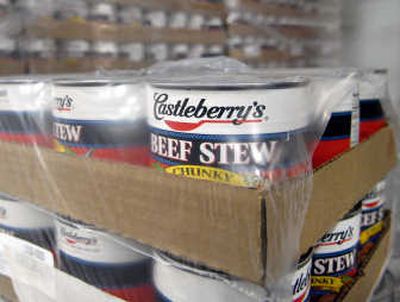Charities remove bad stew

More than 2 million pounds of beef stew destined for low-income food programs in Spokane and across the country will be destroyed after Washington state officials warned that some of the Castleberry’s canned goods showed signs of spoilage.
U.S. Department of Agriculture officials said Tuesday that tests showed the 24-ounce cans of stew were not tainted by botulism that sickened at least four people and sparked a nationwide recall of more than 90 commercial products sold by Castleberry’s Food Company of Augusta, Ga.
Still, they said they weren’t taking any chances after workers at an Olympia warehouse reported in May that nearly 350 cases of stew included cans that were softened or swollen.
“We take our role in feeding hungry people very seriously,” said Jean Daniel, spokeswoman for the Food and Nutrition Service program of the U.S. Department of Agriculture.
Olympia was the only site among dozens nationwide to report suspicious cans of stew, Daniel said.
Samples of the product submitted to a California laboratory showed no sign of the toxin that causes botulism. Instead, the swollen cans were found to be tainted with mold and anaerobic bacteria.
“The problem was they were improperly sealed,” said Daniel, who noted the condition did not pose the life-threatening danger of botulism poisoning.
Even so, the spoiled stew could have made people sick, said Dong Kang, an associate professor of food science at Washington State University.
“If we didn’t find the botulism, is it safe? We can’t say that because other anaerobic spores will be pathogens,” Kang said.
The truckload of stew delivered to Olympia May 9 included 1,000 cases planned for statewide release to the federal Commodity Supplemental Food Programs and the Emergency Food Assistance Program, said Kim Eads, a manager for the state Department of General Administration.
It was part of an estimated $1.5 million federal contract for more than 2 million pounds of stew awarded to Castleberry’s, according to a February food purchase report issued by the USDA’s Agricultural Marketing Service.
All of that stew was placed on hold in May and sent to warehouses nationwide, said Billy Cox, spokesman for the program.
In Spokane, some 312 cases of the beef stew – 7,488 cans – remained quarantined Tuesday on shelves at Second Harvest Inland Northwest.
“It’s not being distributed,” said Executive Director Jason Clark, who was waiting for federal or state officials to pick up the product and replace it with suitable supplies to feed poor mothers, children, seniors and those who need emergency help.
Worries about the tainted stew were accelerated by the national recall, first issued in July, of more than 90 products sold under 27 brands by Castleberry’s, a division of Bumble Bee Foods LLC.
The recall was issued after two children in Texas and a married couple in Indiana were hospitalized with botulism poisoning after eating Castleberry’s hot dog chili sauce, according to the federal Centers for Disease Control and Prevention. A woman in California also came down with the illness after eating a suspect product, but the link could not be confirmed.
The 15-ounce size can of Castleberry’s beef stew was included in the national commercial recall, but the 24-ounce size was not, Daniel noted. The two products were processed on different lines in the company’s Augusta plant, she said.
Although it’s possible to issue a recall for foods included in a federal commodities program, the administrative hold issued in this case will be just as effective.
“It’ll be destroyed,” said Daniel, who acknowledged the $1.5 million price of the stew.
“We’d rather spend that than have anyone have a reaction.”